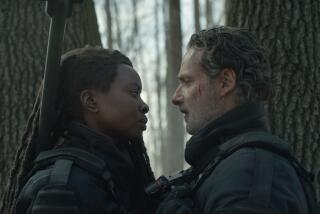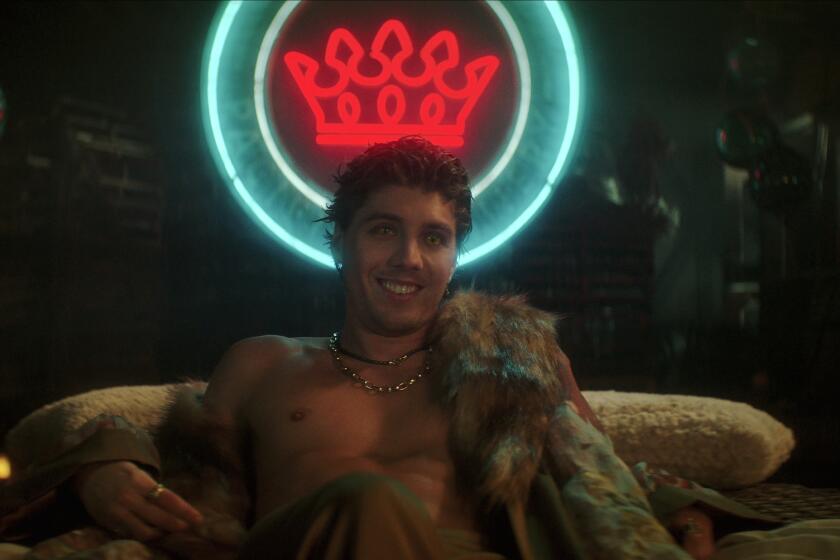‘The Walking Dead’ recap: Merle goes for a ride
So all this time, the third season of “The Walking Dead” has been an earnest entreaty on the benefits of democratic rule?
I’m kidding, of course, but the final act of “This Sorrowful Life,” a generally effective episode of the show that nonetheless got a little winded from getting everything in place for next week’s finale, included a scene where Rick pulled his tiny band of survivors aside and told them that what he said at the end of last season, after the farm burned, no longer applied. No longer would this be the “Rick-tatorship” of Internet memes! No, it was to be a democracy, where everybody’s voice counted equally. If the majority of the group members said they should leave the prison, they would. If the majority wanted to stay and fight, they would do that instead. It was all up to everybody!
Then Rick just walked away, not sticking around to hear what anybody had to say.
Taken in and of itself, this scene works. It’s an effective reversal of that scene from last year, when the show seemed to be setting up a much crueler Rick than we’ve gotten this season. Instead, Rick has been sidelined by the mental strain of losing his wife and leading the group, and the season has mostly dithered on its way to the inevitable confrontations between the prison folk and the Woodbury gang. Again, I didn’t mind this, because it made Rick more interesting to me than he’s ever been on the show. At the same time, though, I wasn’t exactly anticipating this particular story development. If this was a storyline the show had been building all season, it was so far in the background that it didn’t register, and that made the scene in tonight’s episode have maybe a hundredth of its potential effect.
PHOTOS: ‘The Walking Dead’: 10 characters we’ll miss; 5 in danger
It’s also indicative of something that’s sadly apparent about this series: It has a tendency to backload all of the scenes with maximum impact into the last few minutes. Now, granted, this is how a lot of serialized TV works, with the biggest, most cliffhanger-worthy moments crammed into the final act. But the first couple of acts of any given episode of this show can often be downright boring or filled with ridiculous storytelling.
In “This Sorrowful Life,” this manifests itself as a fairly pointless opening act that involves Rick reversing his decision not to turn Michonne over to the Governor just long enough to tell Daryl and Merle about it, then changing his mind again, just so there’s enough time to get Merle to drag Michonne off for the meet-up without Rick knowing what’s happened. It’s so blatantly a way to push the story forward — a cheat on the part of the writers who need to get Merle to a particular place — that it all feels hollow. The show itself, to say nothing of Andrew Lincoln, seems unconvinced by this development, simply playing it out until it can get Merle and Michonne alone in a car.
Fortunately, at that point, the episode immediately begins to perk up, particularly once it comes up with some great predicaments for the two to get through (including one that involves a tied-up Michonne having to stomp a Walker’s head into a pulp). There’s still some weirdness throughout, but by the time Merle has decided not to take Michonne to the meet-up but instead to attempt to take out as many of the Governor’s men as he can on his own, the episode has largely earned the moment, which surprised me. Merle was marked for death the second it was announced Michael Rooker was returning for Season 3, and it also seemed fairly obvious there would be a moment when he ended up on the side of the angels. So this could have ended up being the most predictable episode of what can be a very predictable show.
“Sorrowful Life” works, however, because it leans into the predictability. It decides that if Merle has this change of heart, he’s really going to have it. His plan to distract the Governor’s men with Walkers was awesome, involving a slow rolling car blasting rock music that acts as a Walker decoy and forces the Governor’s men to fire upon the Walkers instead of watching for anyone from the prison. This gives Merle an opportunity to pick them off, his shots mixed in with the shots from the Woodbury party, at least until he himself is attacked by a Walker and reveals his position. It’s a smart plan, and it reveals Merle’s tactical smarts, which the show has spent more time talking about rather than actually displaying.
It’s topped, however, by the scene in the final act, when Daryl, who’s headed to the meet-up to try to prevent Merle from handing over Michonne, arrives to find his zombified brother. Norman Reedus absolutely sells the anguish of the moment, as Daryl is forced to dispatch the one person he cared about more than anyone in the world, even if their relationship had soured in recent weeks. The show still gets plenty of mileage out of moments when the characters see people they once loved in their zombified forms, and this is one of the best examples of that particular trope I can recall.
The Merle redemption provides the spine for the episode, but there are some solid moments in the other storylines as well. Glenn going to Hershel to ask for his blessing in asking Maggie to marry him was a sweet moment, and the actual proposal — complete with a ring he’d removed from the finger of a Walker — was moving as well. The show works best when it can juxtapose a little hope — no matter how tiny — against the misery swirling everywhere else, and the Glenn and Maggie storyline made everything else feel that much more bearable.
It’s also worth pointing out that this episode, helmed by makeup genius Greg Nicotero, has some nicely shot scenes in it. The direction in “Walking Dead” is often more functional than stunning, but I was particularly taken with a shot during Rick’s little speech that pulled back and revealed just how small the band of survivors he leads had gotten, particularly with three of them off and about. The shot of Glenn emerging to walk that long path between fences holding back Walkers worked as well, particularly once you knew why he was heading amongst them (to get that engagement ring). This is the bleak horror Glenn lives with every day, but in this moment, he’s thinking about anything but that. Nicotero’s camera puts you in his headspace quite nicely, and little moments like this kept the episode working for me. “This Sorrowful Life” isn’t a great episode of this show — it’s too clumsy on a storytelling level for that — but it has enough bits and pieces that work to make me hopeful for the finale.
ALSO:
‘The Walking Dead’: 10 characters we’ll miss; 5 in danger
‘Walking Dead’: Glen Mazzara talks the Dixon brothers’ fate
‘Oz the Great and Powerful’ and ‘Walking Dead’? Nicotero is connection
More to Read
The complete guide to home viewing
Get Screen Gab for everything about the TV shows and streaming movies everyone’s talking about.
You may occasionally receive promotional content from the Los Angeles Times.





